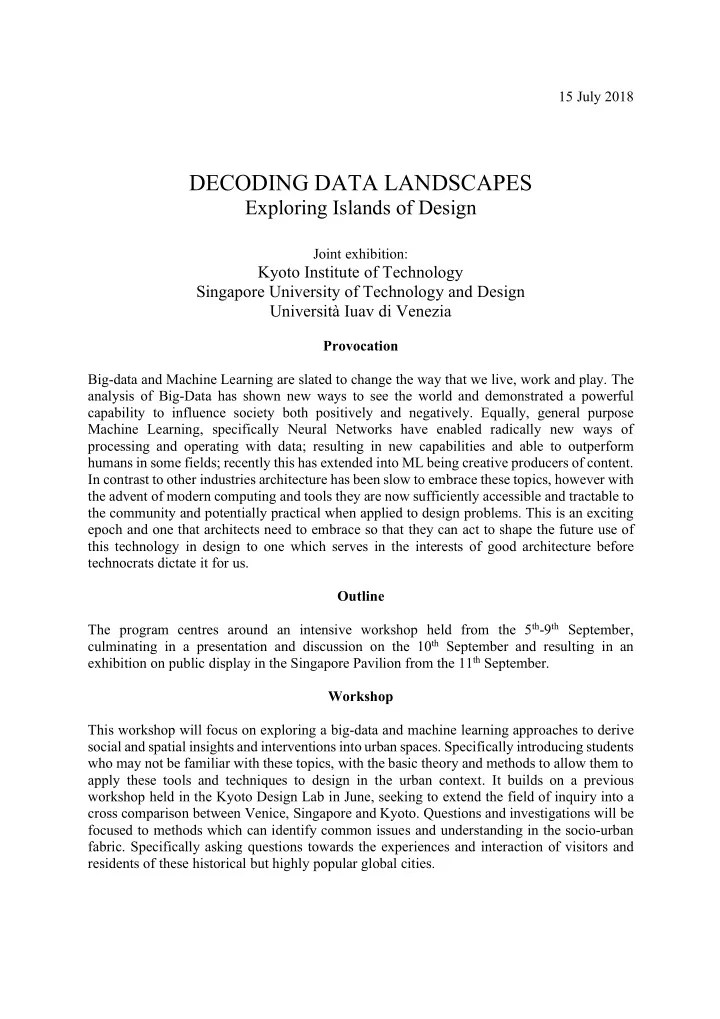

15 July 2018 DECODING DATA LANDSCAPES Exploring Islands of Design Joint exhibition: Kyoto Institute of Technology Singapore University of Technology and Design Università Iuav di Venezia Provocation Big-data and Machine Learning are slated to change the way that we live, work and play. The analysis of Big-Data has shown new ways to see the world and demonstrated a powerful capability to influence society both positively and negatively. Equally, general purpose Machine Learning, specifically Neural Networks have enabled radically new ways of processing and operating with data; resulting in new capabilities and able to outperform humans in some fields; recently this has extended into ML being creative producers of content. In contrast to other industries architecture has been slow to embrace these topics, however with the advent of modern computing and tools they are now sufficiently accessible and tractable to the community and potentially practical when applied to design problems. This is an exciting epoch and one that architects need to embrace so that they can act to shape the future use of this technology in design to one which serves in the interests of good architecture before technocrats dictate it for us. Outline The program centres around an intensive workshop held from the 5 th -9 th September, culminating in a presentation and discussion on the 10 th September and resulting in an exhibition on public display in the Singapore Pavilion from the 11 th September. Workshop This workshop will focus on exploring a big-data and machine learning approaches to derive social and spatial insights and interventions into urban spaces. Specifically introducing students who may not be familiar with these topics, with the basic theory and methods to allow them to apply these tools and techniques to design in the urban context. It builds on a previous workshop held in the Kyoto Design Lab in June, seeking to extend the field of inquiry into a cross comparison between Venice, Singapore and Kyoto. Questions and investigations will be focused to methods which can identify common issues and understanding in the socio-urban fabric. Specifically asking questions towards the experiences and interaction of visitors and residents of these historical but highly popular global cities.
The workshop will be led by Assistant Professor Sam Conrad Joyce of SUTD with local support of Laura Cipriani representing Università Iuav di Venezia and input from KIT D-Lab professors Ota, Okada and Ono giving an angle from contemporary design and urban history. The workshop will be combining public data-sets sourced from government planning, Open Street Map with more populist fields such as Twitter and Instagram. Students will be challenged with investigating relevant architectural and spatial questions, relating to social and liveability which the data can help uncover. Learning how to develop these in to analytical questions and machine learning routines, using the big data as well as finding other novel sources to link space to activity by finding correlations. Initially with visualisations to link the social and digital space in ways that imagines new way to help designers and master planners to understand the city in more rich ways, but also developing creative ML which could act with the human designer, specifically the promising class of Generative Adversarial Networks. This workshop itself standalone and will assume no prior knowledge except for some experience in Python programming. It is designed to introduce new topics and skills specifically in analytics and A.I.. It will be relatively structed to ensure that even new comers to the field can develop skills, with an tutored but open final two days targeted at allowing participants in groups to develop an analytics and ML idea into something to present on the presentation day. Presentation The presentation will be joined by workshop leader Sam Joyce of SUTD, Laura Cipriani from Università Iuav di Venezia, Professors Ota and Ono from Kyoto University of Design and chaired by Professor Erwin Viray, Head of Pillar of Architecture and Sustainable design at SUTD. It will present existing work undertaken in Kyoto to provide context and then the work of the workshop participants in Vince. There will be a discussion on the future benefits and concerns of Big-Data and Machine Learning in the architecture and urban context suing the exiting work as a catalyst. Exhibition Exhibition will curate and summarise the work of the Venice and Kyoto workshops and . It will present the visual explorations as well as findings of both events. This will be shown as part of a digital summary using the screens available at the Singapore pavilion. This will then be open to the public until the end of the month.
Proposed Timetable Preworkshop Preworkshop self-tutorial guide explaining and setting up the tools required Approximately 1-2 hours depending on familiarity Workshop 5 th 10:00 – Welcome – Workshop Housekeeping 11:00 – Introduction to Anaconda Python 12:00 – Lunch 13:00 – Introduction to social analytics, sentiment analysis, Twitter data passing 14:00 – Hand on workshop spatial analysis with Python and open map data 18:00 – Introduction Apéro Spritz 6 th 10:00 – Introduction to machine learning including generative creative ML 12:00 – Lunch 13:00 – Machine learning workshop 16:00 – Introduction to two-day project 18:00 – End 7 th 10:00 – Support/tutorials for two-day project 12:00 – Sharing of project ideas 13:00 – Lunch 14:00 – Tutorials for two-day project 18:00 – End 8 th 10:00 – Support/tutorials for two-day project 13:00 – Lunch 14:00 – Tutorials for two-day project 14:00 – Presentation preparation 20:00 – Collation of work Symposium 9 th 10:00 – Collation and Summarising 12:30 – Introduction 13:00 – Presentation of Kyoto and Venice workshop output 14:00 – Discussions on the futures of Big-data and Machine Learning in Design 18:00 – Post event Exhibition 10 th – 30 th Public display of the curated work in the Singapore Pavilion
Recommend
More recommend